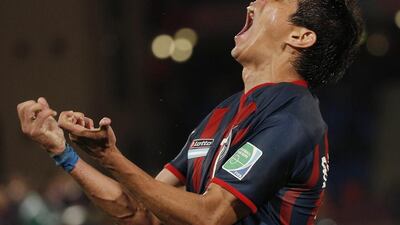South American champions San Lorenzo will meet Real Madrid in Saturday’s Club World Cup final in Marrakech.
Madrid have won their past 21 games and outclassed Mexican side Cruz Azul 4-0 in their semi-final. San Lorenzo, from Buenos Aires, narrowly won 2-1 over Auckland City, a side comprised of semi-professional and amateur players, with the winner coming in injury time.
Madrid will be clear favourites, but they are up against one of Argentina’s best-supported teams, who count Pope Francis as a fan.
More than 1,000 fans saw the team off at Buenos Aires airport with a chaotic din a week ago, bringing coach Edgardo Bauza to say: “We are already beginning to feel something that is really exciting. It is amazing.”
Five thousand fans have made the trip across the Atlantic to Morocco. Their non-stop singing was the highlight of a disappointing semi-final, with a song to the tune of Bad Moon Rising reverberating as it did with Argentina’s fans in the 2014 World Cup finals.
Diego Maradona was among many to compliment the vociferous fans of San Lorenzo, who were the first Argentine club to compete in the Copa Libertadores in 1960.
Long considered one of Argentina’s big five alongside River Plate, Boca Juniors, Racing and Independiente, they were the only one denied Libertadores success.
They were also the first of the big five to be relegated and seldom justified their status as the team with the third most members in Argentina after Boca and River.
San Lorenzo won the Copa Sudamericana in 2002, but they had to wait until 2014, when they beat Nacional of Paraguay in August, to win the big one.
Pope Francis said: “I am very happy about it, but, no, it is not a miracle.”
The victory meant their rivals could finally stop teasing them about their lack of Libertadores wins. It also cleared their debts.
San Lorenzo play in the Flores neighbourhood across the road from the largest ghetto of informal housing in Argentina.
Velez Sarsfield, who won the Libertadores in 1994, play nearby in Buenos Aires’ sprawling western suburbs, though San Lorenzo are originally from Boedo, four kilometres to the west.
They were evicted from their home in 1979 by the military dictatorship who wanted to improve access to the southern side of the city.
A supermarket stands on the site, and for years San Lorenzo were taunted by cries of “Where are you from?” from rival fans as they played games in various stadiums, including that of their main rivals, Huracan.
They moved to their 43,000-capacity home in 1993, but it is in Boedo that they hope to build a new stadium, which they will name after Pope Francis, who has twice received a trophy-bearing delegation to the Vatican in recent years.
San Lorenzo wore his image on their shirts after he was ordained in 2013.
The name San Lorenzo comes from the priest Lorenzo Massa, who allowed youngsters to use church land for their first pitch.
Their recent rise began in 2012 after they had finished 17th in Argentina’s top flight and had to win a relegation play-off.
The club was facing financial ruin when Marcelo Tinelli, a famous Argentine TV presenter, and businessman Matias Lammens became president and vice president respectively.
They appointed a sports director – rare in Argentina – in Bernardo Romeo, also bringing in Juan Antonio Pizzi as coach, and they promptly won the league in 2013 – a first for 21 years.
Teenage striker Angel Correa (now with Atletico Madrid), midfielder Ignacio Piatti, defender Santiago Gentiletti (now at Lazio) and midfielder Julio Buffarini emerged as their stars.
Pizzi then moved on to Valencia, and he was replaced by Ecuadorean coach Bauza in December 2013.
He had led Ecuadorean side LDU Quito to Libertadores success in 2008 and to a World Club final where they were beaten by Manchester United in Yokohama – and finally took San Lorenzo to the prize for which they had been waiting.
The club, which includes former players Ezequiel Lavezzi, Fabricio Coloccini and Pablo Zabaleta, are enjoying the greatest period of their history.
Saturday, they have the chance to be crowned world champions for the first time.
sports@thenational.ae


